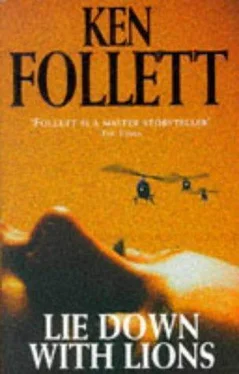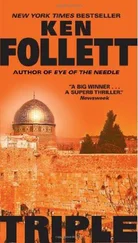Ken Follett - Lie down with lions
Здесь есть возможность читать онлайн «Ken Follett - Lie down with lions» весь текст электронной книги совершенно бесплатно (целиком полную версию без сокращений). В некоторых случаях можно слушать аудио, скачать через торрент в формате fb2 и присутствует краткое содержание. Жанр: Боевик, на английском языке. Описание произведения, (предисловие) а так же отзывы посетителей доступны на портале библиотеки ЛибКат.
- Название:Lie down with lions
- Автор:
- Жанр:
- Год:неизвестен
- ISBN:нет данных
- Рейтинг книги:4 / 5. Голосов: 1
-
Избранное:Добавить в избранное
- Отзывы:
-
Ваша оценка:
- 80
- 1
- 2
- 3
- 4
- 5
Lie down with lions: краткое содержание, описание и аннотация
Предлагаем к чтению аннотацию, описание, краткое содержание или предисловие (зависит от того, что написал сам автор книги «Lie down with lions»). Если вы не нашли необходимую информацию о книге — напишите в комментариях, мы постараемся отыскать её.
Lie down with lions — читать онлайн бесплатно полную книгу (весь текст) целиком
Ниже представлен текст книги, разбитый по страницам. Система сохранения места последней прочитанной страницы, позволяет с удобством читать онлайн бесплатно книгу «Lie down with lions», без необходимости каждый раз заново искать на чём Вы остановились. Поставьте закладку, и сможете в любой момент перейти на страницу, на которой закончили чтение.
Интервал:
Закладка:
The Russians took heart then, and most of them—eighty or more men, Ellis estimated—began moving toward the bridge on their bellies, firing constantly. They can't be as dispirited or undisciplined as the American newspapers say, Ellis thought, unless this is an elite outfit. Then he realized that the soldiers all seemed white-skinned. There were no Afghans in this force. It was just like Vietnam, where the Arvins were always kept out of anything really important.
Suddenly there was a lull. The Russians in the barley field and the guerrillas in the village exchanged fire across the river in a desultory fashion, the Russians shooting more or less at random, the guerrillas using their ammunition sparingly. Ellis looked up. The Hinds in me air were going after Yussuf and Abdur on the cliff. The Russian commander had correctly identified the heavy machine guns as his main target.
As a Hind swooped toward the clifftop gunners, Ellis had a moment of admiration for the pilot, for flying directly at the guns: he knew how much nerve that took. The aircraft veered away: they had missed one another.
Their chances were roughly equal, Eilis thought: it was easier for Yussuf to aim accurately, because he was stationary whereas the aircraft was moving; but by the same token he was the easier target because he was still. Ellis recalled that in the Hind the wing-mounted rockets were fired by the pilot, while the gunner operated the machine gun in the nose. It would be hard for a pilot to aim accurately in such terrifying circumstances, Ellis thought; and since the Dashokas had a greater range than the helicopter's four-barrel Gatling-type gun, perhaps Yussuf and Abdur had a slight edge.
I hope so, for the sake of all of us, Ellis thought.
Another Hind descended toward the cliff like a hawk falling on a rabbit, but the guns drummed and the helicopter exploded in midair. Ellis felt like cheering—which was ironic, for he knew so well the terror and barely controlled panic of the helicopter crew under fire.
Another Hind swooped. The gunners were a fraction wide this time, but they shot off the helicopter's tail, and it went out of control and crashed into the face of the cliff, and Ellis thought: Jesus Christ, we may yet get them all! But the note of the guns had changed, and after a moment Ellis realized that only one was firing. The other had been knocked out. Ellis peered through the dust and saw a Chitrali cap moving up there. Yussuf was still alive. Abdur had been hit.
The three remaining Hinds circled and repositioned. One climbed high above the battle: the Russian commander must be in that one, Ellis thought. The other two descended on Yussuf in a pincer movement. That was smart thinking, Ellis thought anxiously, for Yussuf could not shoot at both of them at once. Ellis watched them come down. When Yussuf aimed at one, the other swooped lower. Ellis noticed that the Russians flew with their doors open, just as the Americans had in Vietnam.
The Hinds pounced. One dived at Yussuf and veered away, but he scored a direct hit and it burst into flames; then the second was swooping, rocket pods and guns blazing away, and Ellis thought Yussuf doesn't stand a chance! and then the second Hind seemed to hesitate in midair. Had it been hit? It fell suddenly, going twenty or thirty feet straight down—When your engine cuts out, the instructor in flight school had said, your helicopter will glide like a grand piano—and crashed on the ledge just a few yards from Yussuf; but then its engine seemed to catch again, and to Ellis's surprise it began to lift. It's tougher than a goddam Huey, he thought; helicopters have improved in the last ten years. Its gunner had been blazing away all the time, but now he stopped. Ellis saw why and his heart sank. A Dashoka came tumbling over the edge of the cliff in a welter of camouflage, bushes and branches; and it was followed immediately by a limp mud-colored bundle that was Yussuf. As he fell down the face of the cliff, he bounced off a jagged outcrop halfway, and his round Chitrali cap came off. A moment later he disappeared from Ellis's view. He had almost won the battle single-handed: there would be no medal for him, but his story would be told beside campfires in the cold Afghan mountains for a hundred years.
The Russians had lost four of their six Hinds, one Hip, and about twenty-five men; but the guerrillas had lost both their heavy guns, and now they had no defense as the two remaining Hinds began to strafe the village. Ellis huddled inside his hut, wishing it were not made of mud. The strafing was a softening-up tactic: after a minute or two, as if at a signal, the Russians in the barley field rose from the ground and rushed the bridge.
This is it, Ellis thought; this is the end, one way or another.
The guerrillas in the village fired on the charging troops, but they were inhibited by the air cover and few Russians fell. Almost all the Russians were on their feet now, eighty or ninety men, firing blindly across the river as they ran. They were yelling enthusiastically, encouraged by the thinness of the defense. The guerrillas' shooting became a little more accurate as the Russians reached the bridge, and several more fell, but not enough to halt the charge. Seconds later the first of them had crossed the river and were diving for cover among the houses of the village.
There were about sixty men on or near the bridge when Ellis pulled the handle of the firing device.
The ancient stonework of the bridge blew up like a volcano.
Ellis had laid his charges to kill, not for a neat demolition, and the explosion sprayed lethal chunks of masonry like a burst from a giant machine gun, taking out all the men on the bridge and many still in the barley field. Ellis ducked back into his hut as rubble rained on the village. When it stopped he looked out again.
Where the bridge had been, there was just a low pile of stones and bodies in a grisly melange. Part of the mosque and two village houses had also collapsed. And the Russians were in full retreat.
As he watched, the twenty or thirty men still left alive scrambled into the open doors of the Hips. Ellis did not blame them. If they stayed in the barley field, with no cover, they would be wiped out slowly by the guerrillas in good positions in the village; and if they tried to cross the river they would be picked off in the water like fish in a barrel.
Seconds later, the three surviving Hips took off from the field to join the two Hinds in the air, and then, without a parting shot, the aircraft soared away over the clifftop and disappeared.
As the beat of their rotors faded, he heard another noise. After a moment he realized that it was the sound of men cheering. We won, he thought. Hell, we won. And he started cheering, too.
CHAPTER 13
"AND WHERE have all the guerrillas gone?" Jane asked.
"They scattered," Ellis replied. "This is Masud's technique. He melts away into the hills before the Russians can catch their breath. They may come back with reinforcements—they could even be at Darg now—but they will find nobody to fight. The guerrillas have gone, all but these few."
There were seven wounded men in Jane's clinic. None of them would die. Twelve more had been treated for minor wounds and sent on their way. Only two men had died in the battle, but by a heartbreaking stroke of bad luck one of them was Yussuf. Zahara would be in mourning again—and again it was because of Jean-Pierre.
Jane felt depressed, despite Ellis's euphoria. I must stop brooding, she thought. Jean-Pierre has gone, and he isn't coming back, and there's no point in grieving. I should think positively. I should take an interest in other people's lives.
"What about your conference?" she asked Ellis. "If all the guerrillas have gone away ..."
"They all agreed," Ellis said. "They were so euphoric, after the success of the ambush, that they were ready to say yes to anything. In a way the ambush proved what some of them had doubted: that Masud is a brilliant leader and that by uniting under him they can achieve great victories. It also established my macho credentials, which helped."
Читать дальшеИнтервал:
Закладка:
Похожие книги на «Lie down with lions»
Представляем Вашему вниманию похожие книги на «Lie down with lions» списком для выбора. Мы отобрали схожую по названию и смыслу литературу в надежде предоставить читателям больше вариантов отыскать новые, интересные, ещё непрочитанные произведения.
Обсуждение, отзывы о книге «Lie down with lions» и просто собственные мнения читателей. Оставьте ваши комментарии, напишите, что Вы думаете о произведении, его смысле или главных героях. Укажите что конкретно понравилось, а что нет, и почему Вы так считаете.












